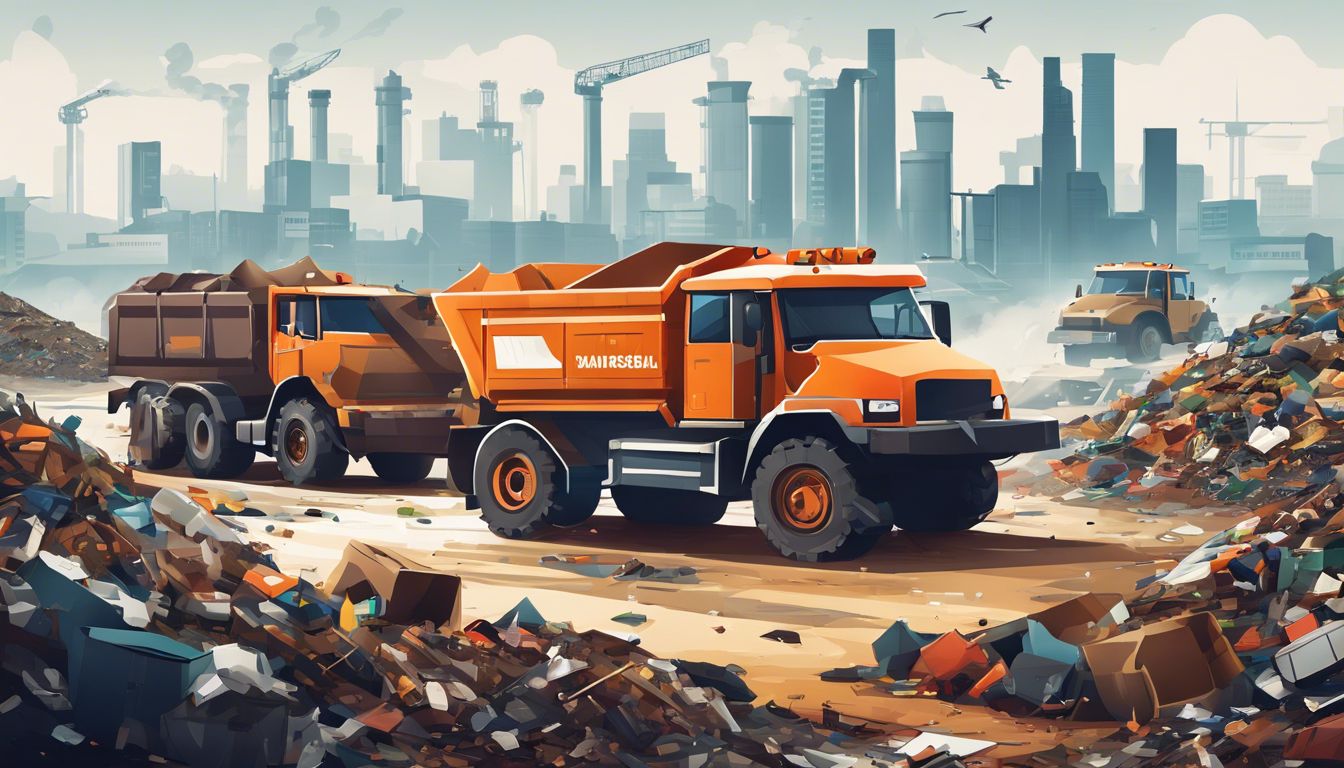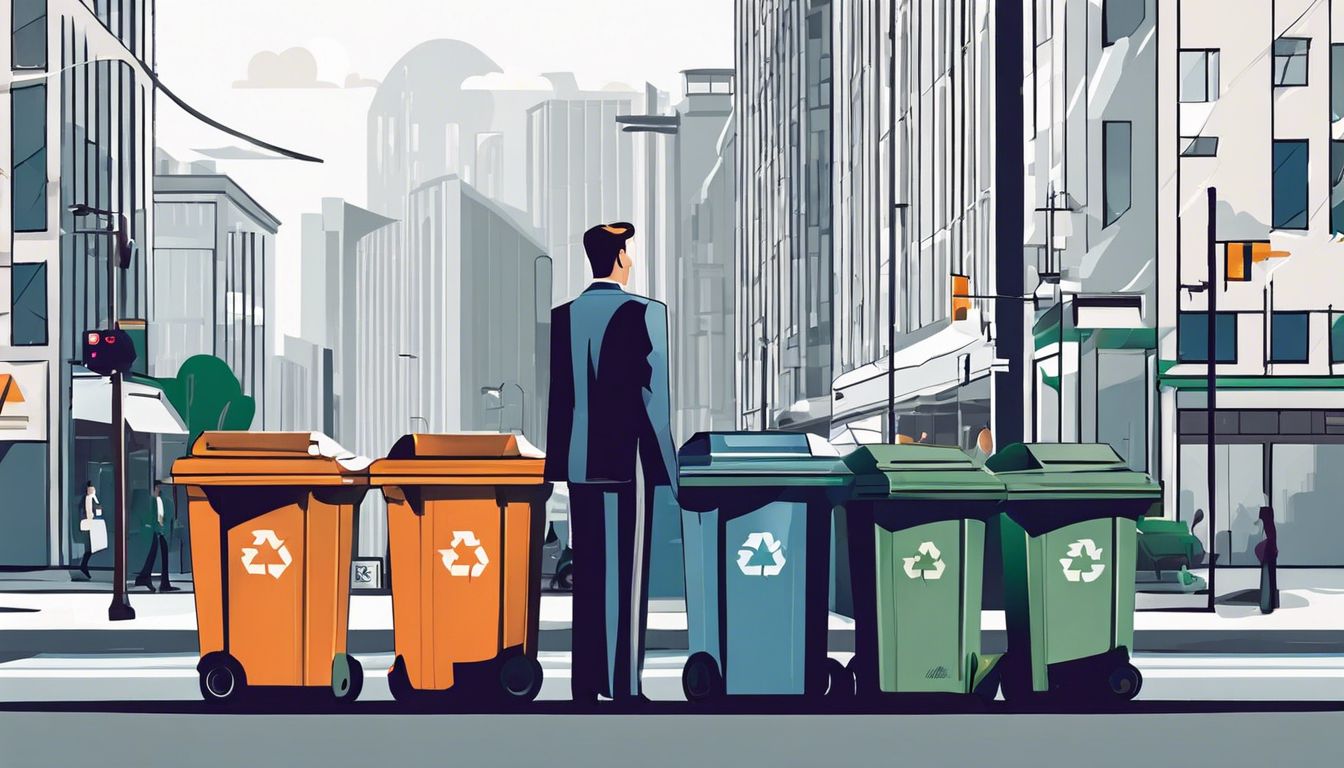Let's talk about the money side of throwing waste away for businesses. This article covers the commercial waste disposal company rates that businesses have to pay when they get rid of their waste. All around the world, these costs are going up.
Right now, for example in New York City, businesses can be charged more than $24.21 for every cubic-shaped yard of waste or $15.89 for every 100 pounds they toss out. But these prices could climb higher because everything is getting more expensive to do, including handling waste.
Nowadays, things are costing more because of inflation, which means the price we pay for services (like throwing our rubbish) keeps rising too! Last year, they agreed twice to let waste management companies charge more: once by 9% and another time by 7%.
That was the first time they'd ever agreed to two hikes in one year!
Waste collection and disposal isn't just about money; it also hurts our planet if we don't do it right.
There are cool places called Waste Transfer Stations that help save some cash by cutting down on travel distances for dump trucks, reusing waste, recycling it, and undertaking materials reprocessing and recycling.
Later on in this article, we'll show you how different places and types of waste can affect how much businesses end up paying—and why recycling including plastics, matters a lot here too.
Keep reading as we dig deeper into what companies need to spend on getting rid of garbage and look at ways to do it without wasting money or hurting our world!
Commercial Waste Disposal Company Rates: Key Takeaways
- New York is fairly typical of global price rises. In NY waste companies increased commercial rates by about 9% in 3023 and plan another hike of 7%. Businesses must use containers for their trash by March 2024.
- Landfill tipping fees vary in the U.S. The Northeast has the highest at $85.50 per ton, while the South is lowest at $39.29 per ton.
- Inflation is causing higher disposal costs. Waste Connections wants a further rate increase to cover rising expenses.
- Improper waste management causes pollution and extra collection costs due to overloaded containers.
- Waste transfer stations reduce transport expenses, helping businesses cut down on disposal costs.
- Costs of waste disposal differ by region and type of waste; New York has some of the highest fees.
- Plastic recycling can save money on disposal fees and even earn income while also reducing environmental harm.
Current State of Commercial Waste Rates

Understanding the landscape of commercial waste disposal company rates is integral for businesses aiming to optimise their operations. Recent shifts, including those in New York, reflect a dynamic market where an understanding of national landfill tipping fees becomes essential in managing costs effectively.
Recent increases in New York
New York has seen a sharp rise in commercial waste rates. Waste Connections and others pressed for a 9% hike in the city’s cap on these charges. The Business Integrity Commission gave the green light to this jump, marking a historic double increase within a single year – first by 9% in June, followed by another 7% come October.
Commercial businesses now face stricter rules from New York City's Department of Sanitation. They must put their trash in containers. Time is ticking; all must comply before March 2024 strikes.
This move aims at more orderly streets and could cut down overall disposal costs in the long run. However, it’s clear – staying ahead means adapting quickly to these cost spikes without compromising environmental responsibilities or service quality.
Average national landfill tipping fee
Understanding the average national landfill tipping fee is an essential aspect of financial planning for company waste managers. These fees represent the cost to dump waste at a landfill and are a critical factor when tendering for waste collection services.
| Region | Average Landfill Tipping Fee (per ton) |
|---|---|
| Northeast | $85.50 |
| Midwest | $54.52 |
| South | $39.29 |
| West | $66.02 |
Fees vary considerably by region, reflecting differing local policies, landfill availability, and market conditions. They play a pivotal role in the overall cost structure of commercial waste management services. Waste managers must keep abreast of these fees to negotiate better deals and manage budgets effectively. Commercial waste disposal company rates are subject to change, underlining the importance of staying informed to maintain control over waste disposal expenses.
The Impact of Inflation on Commercial Waste Rates

As inflation continues to surge, commercial waste disposal company rates are feeling the pinch; it's an inevitable upward trend affecting both disposal and containerisation expenses. Businesses grappling with this financial swell face a pressing need to understand and adapt to these escalating costs without compromising on environmental responsibilities.
Rising disposal and containerisation costs
Disposal and containerisation costs are climbing. This is hitting businesses hard, especially in the waste management sector. The National Waste & Recycling Association (NWRA) has flagged a crucial update — they want to raise the commercial waste rate cap by at least 9%.
Containerisation rules are tightening too. New York City's Department of Sanitation now demands that many business types must start using containers for their waste.
Costs are up across the board, with landfill tipping fees rising 6% last year alone. Inflation isn't helping. It's pushing commercial waste disposal company rates higher and faster than many anticipated. Every company managing waste feels these changes.
Staying on top of them means being smart about handling your commercial rubbish without cutting corners on environmental responsibility.
The call for rate cap increases
Companies like Waste Connections are pushing for higher rate caps in New York. They argue that costs keep climbing, so they need at least a 9% boost. It's not just one voice; major industry groups agree.
They see the producer price index going up and believe it's time to change how rates are set.
Last year saw some shifts already. The Business Integrity Commission nodded through two hikes — that’s a first. Still, the National Waste & Recycling Association and others want more freedom.
Instead of fixed caps, they prefer setting their own commercial waste disposal company rates to stay ahead of rising expenses.
External Costs of Commercial Waste Disposal
While commercial entities diligently focus on the bottom line, often overlooked are the external costs of waste disposal—costs that extend beyond mere financial outlays. These encompass environmental impacts such as pollution from improper waste handling and the strain on resources due to excess rubbish collection needs, subtly yet significantly adding to a company's indirect expenses and societal burden.
Pollution caused by improper waste disposal
Improper waste disposal harms our planet. It pollutes the air, land, and water. When businesses don't throw away their trash right, it can leak toxic chemicals into the ground. These poisons can get into our drinking water and make people sick.
Thrown-out things placed in landfills also create greenhouse gases. These gases trap heat in the atmosphere and lead to climate change. Trash that's not properly managed often ends up as litter or in illegal dump sites.
This ruins natural beauty and harms wildlife habitats.
The cost of extra rubbish collection and overloaded containers
Extra rubbish collection and overloaded containers come with high costs. Cities like New York are feeling the pressure as waste managers face rising fees. More waste means more pickups, which leads to increased labor and fuel expenses.
Companies also deal with extra fees for tipping large amounts of rubbish at landfills.
Overloaded containers can cause big problems, too. They may lead to spills and street pollution, prompting emergency clean-ups that cost money and time. To avoid these issues, businesses must manage their waste smartly—planning for space and pickup schedules is key.
This careful planning helps keep costs under control and the streets cleaner.
Benefits of Waste Transfer Stations in Reducing Costs
Waste transfer stations play a pivotal role in streamlining commercial waste management—they act as intermediaries that cut down on haulage distances, trimming transport expenses significantly.
By centralizing rubbish before it's moved to distant disposal facilities, they not only optimize logistical operations but also translate into tangible savings for businesses grappling with the complexities of waste disposal costs at the commercial waste disposal company rates.
Lower transportation costs to disposal facilities
Waste transfer stations are key in cutting down costs for companies. They allow rubbish to be collected locally before being transported in bulk to distant disposal sites. This means trucks spend less time on the road, saving fuel and reducing wear and tear.
Fewer trips lead to cost savings that can make a big difference to your bottom line.
Choosing the right disposal facilities also lowers transportation expenses. Facilities closer to your business mean shorter routes for garbage trucks. Shorter routes save money on fuel and help cut down on greenhouse gas emissions from fossil fuels.
This is not just good for the environment; it's smart business strategy that keeps expenditure low and efficiency high.
Unveiling Commercial Waste Collection Costs
Discovering the intricacies of commercial waste collection costs can be a revealing exercise, offering insights into how businesses are impacted by regional variations and waste types; stay tuned for an in-depth analysis that could transform your approach to waste management.
Range of costs depending on waste type and location
Navigating the complexities of commercial waste collection costs necessitates a comprehensive understanding of how prices vary by waste type and location. These differences reflect the disposal methods required and the environmental regulations in place, which can significantly impact your organization's bottom line. Below is an easy-to-understand table detailing the range of costs you might encounter:
| Location | General Waste | Recyclables | Organic Waste | Hazardous Waste |
|---|---|---|---|---|
| US North East | $24.21 per cubic yard | $20.00 – $30.00 per tonne | $10.00 to $50.00 per tonne | $50.00 – $500.00 per tonne |
| US West Coast | $30.00 – $70.00 per tonne | $10.00 – $40.00 per tonne | $-10.00 to $30.00 per tonne | $100.00 – $600.00 per tonne |
| US North Central | $50.00 – $100.00 per tonne | $15.00 – $45.00 per tonne | $15.00 to $60.00 per tonne | $200.00 – $700.00 per tonne |
| London | £80.00 – £150.00 per tonne | £65.00 – £90.00 per tonne | £-20.00 to £70.00 per tonne | £250.00 – £1000.00 per tonne |
The above is a very rough guide and must be checked with your waste company.
Commercial waste managers should utilize this summary to forecast budgets accurately and identify potential savings. Remember, the correct disposal of each waste type not only aids in compliance but also contributes to a more sustainable environment. Regularly revisiting and renegotiating your waste collection contracts can align with changing market rates and technological advances in waste management.
Comparison of costs across different regions
Understanding the regional variations in commercial waste disposal costs is crucial for company waste managers. It's imperative to make informed decisions that align with budgetary constraints and environmental considerations. Let's dive into the comparative costs across different U.S. regions.
| Region | Cost per Cubic Yard | Cost per 100 Pounds | Notes |
|---|---|---|---|
| New York | Up to $24.21 | Up to $15.89 | Proposed increase by at least 9% |
| Midwest | $20 – $30 | $10 – $20 | Varies significantly by state |
| West Coast | $30 – $40 | $20 – $30 | Higher due to stricter regulations |
| South | $15 – $25 | $8 – $18 | Generally lower due to less regulation |
| East Coast (excluding NY) | $25 – $35 | $15 – $25 | Can vary widely based on urban vs rural |
No landfill tax included in above table.
The table depicts clear regional disparities in commercial waste disposal fees. New York remains on the higher end, with potential increases looming. The Midwest shows wider variability, indicating state-specific policies influence costs. The West Coast often incurs higher fees, likely a reflection of the stringent environmental oversight. Conversely, the South tends to have more economical rates, attributing to less regulatory pressure. East Coast figures, not including New York, indicate a moderate range, yet urbanisation significantly affects pricing.
With these insights, waste managers can better strategise and allocate resources. Transitioning to the role of plastic recycling in commercial waste management reveals the next vital piece of the cost-saving puzzle.
The Role of Plastic Recycling in Commercial Waste Management
Plastic recycling is changing the game in commercial waste management. It turns old plastic into new products, slashing the amount of junk that ends up in landfills. Companies can save money by reducing their disposal fees and sometimes even make cash from selling recyclable plastics.
This process also cuts down on the need for raw materials, helping to preserve our planet's resources.
Recycling plastic isn't just good for business; it's a step towards a more sustainable future. By keeping these materials out of dumps, we prevent pollution of both air and water. With advanced recycling technologies, even complex plastics can now be handled better.
Firms are turning to these eco-friendly methods as part of responsible waste management practices—making sure nothing valuable goes to waste and supporting environmental justice at the same time.
Conclusion
Managing waste disposal costs is crucial for companies. Smart strategies help businesses save money and keep our planet cleaner. It's about making the right choices, not the cheapest ones.
Practical steps can make a big difference without cutting corners. Let's tackle waste wisely and protect our environment together.
Commercial Waste Disposal Company Rates – FAQs
1. Why are commercial waste disposal rates important?
Commercial waste disposal rates matter because they help businesses manage costs whilst dealing with waste sustainably and legally, avoiding illegal dumping and environmental harm.
2. What can companies do to reduce their commercial waste costs?
To cut expenses, companies can practice recycling, use recyclable materials, adopt a zero-waste approach like precycling – reducing before buying – and support sustainable waste management methods.
3. How does the circular economy affect commercial waste disposal charges?
The circular economy promotes using items for as long as possible; this lessens the need for new products and cuts down on waste, potentially reducing waste industry fees over time.
4. Are there any risks if a business doesn't handle its commercial waste properly?
Definitely – firms that don’t dispose of waste correctly risk fines, contribute to polluting our planet with plastic or hazardous materials and may face backlash from aware consumers.
5. What is Extended Producer Responsibility (EPR) about commercial waste collection and recycling?
Extended Producer Responsibility means makers must deal with what they produce at its life's end—this helps lower electronic or medical rubbish buildup and encourages environmentally friendly designs.
6. Can businesses receive benefits or credits for managing their rubbish better?
Indeed they can! By engaging in practices like anaerobic digestion which turns organics into biogas or by improving recycling efforts, businesses might earn carbon offset credits under schemes like the Clean Development Mechanism.
Cost of Commercial Waste Disposal UK: Keeping the Numbers Low: What UK Rubbish Really Costs
Managing rubbish costs money. UK companies know this too well, as they deal with heaps of trash every day. Every year, these businesses create 27.5 million tonnes of commercial waste and 13.6 million tonnes of industrial waste – that's a mountain weighing 41.1 million tonnes! Tossing all that waste can eat up to 4-5% of […]
e-waste recycling companies for businesses: No Digital Dumping. Instead apply the best E-Waste Solutions
E-waste recycling for businesses is a big deal. It's about getting rid of old electronics the right way. In 2016, we had 44.7 million tons of e-waste around the world, but only a bit got recycled properly. That's not good because this stuff has harmful things like mercury and lead that can hurt our planet […]
Comparing US Waste Disposal Companies: Top Landfill Waste Competitors: The Ultimate Eco Disposal Company Showdown
Waste disposal companies play a big role in how we take care of our planet. They handle the trash and recycling from homes, businesses, and cities. Some of the biggest names in this industry are Waste Management, Republic Services, Veolia North America, Rumpke Waste & Recycling, and Casella Waste Systems, Inc. These companies work to […]
Waste Companies Offering Eco-friendly Services – UK's Best Circular Economy Waste Services
Think about how we throw away stuff. Imagine if that waste could help make new things. Well, that's the mission of all waste companies offering eco-friendly services. This idea is called circular economy in waste management. It's like a loop where trash gets a new life instead of hurting our planet. In the UK, some […]









